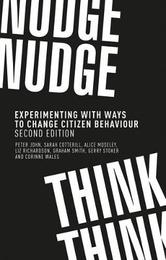
|
Nudge, Nudge, Think, Think: Experimenting with Ways to Change Citizen Behaviour,
Paperback / softback
Main Details
| Title |
Nudge, Nudge, Think, Think: Experimenting with Ways to Change Citizen Behaviour,
|
| Authors and Contributors |
By (author) Peter John
|
|
By (author) Sarah Cotterill
|
|
By (author) Alice Moseley
|
|
By (author) Liz Richardson
|
|
By (author) Graham Smith
|
| Physical Properties |
| Format:Paperback / softback | | Pages:320 | | Dimensions(mm): Height 198,Width 129 |
|
| ISBN/Barcode |
9781526140555
|
| Classifications | Dewey:361.61 |
|---|
| Audience | | Tertiary Education (US: College) | | Professional & Vocational | |
|---|
| Illustrations |
1 black & white illustration, 8 graphs, 1 chart
|
|
Publishing Details |
| Publisher |
Manchester University Press
|
| Imprint |
Manchester University Press
|
| Publication Date |
24 June 2019 |
| Publication Country |
United Kingdom
|
Description
This book builds on the 'nudge' idea proposed by Richard Thaler and Cass Sunstein, proposing an alternative 'think' strategy that calls on citizens to decide their own priorities as part of a process of civic and democratic renewal. It sets out the different approaches in theory and presents a series of experiments that show them in action. -- .
Author Biography
Peter John is Professor of Public Policy at King's College London; Sarah Cotterill is Senior Lecturer in the Centre for Biostatistics at the University of Manchester; Alice Moseley is Lecturer in Politics at the University of Exeter; Liz Richardson is Reader in Politics at the University of Manchester; Graham Smith is Professor of Politics at the University of Westminster; Gerry Stoker is Professor of Governance at the University of Southampton; Corinne Wales is Head Of English at International College, University of Dundee -- .
Reviews'A pathbreaking book that for the first time brings smart policy insights into contact with creative, rigorous testing. This book sets the standard for all future scientific evaluations of "what works".' Donald P. Green, Burgess Professor of Political Science, Columbia University 'Nudge, nudge, think, think not only informs the reader about how nudge and think strategies can be combined, but also about what the potential benefits and drawbacks of such strategies are for a range of public behaviours.' Sander van der Linden, LSE British Politics and Policy blog -- .
|